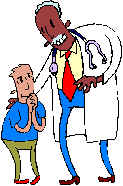 About
the Author
About
the AuthorPeptic Ulcer & Other Health Articles Health Discussions Disease Information Center DiagnosisHealth Home
 About
the Author
About
the AuthorDr. Minocha (http://www.diagnosishealth.com/minocha.htm) is the Professor of Medicine and Director, Division of Digestive Diseases at the University of Mississippi Medical Center in Jackson, MS, and is the author of How to Stop Heartburn; Simple Ways to Heal Heartburn and Acid Reflux. Read Daily Stomach Ulcer Peptic Ulcer Health News/Tips Here
![]()
![]() What
is peptic ulcer disease (PUD)? The term PUD generally refers to spectrum of disorders that
includes gastric ulcer (GU), pyloric channel ulcer, duodenal ulcer (DU) and postoperative
ulcers at or near the site of surgical anastomosis.
What
is peptic ulcer disease (PUD)? The term PUD generally refers to spectrum of disorders that
includes gastric ulcer (GU), pyloric channel ulcer, duodenal ulcer (DU) and postoperative
ulcers at or near the site of surgical anastomosis.
 HISTORICAL
PERSPECTIVE
HISTORICAL
PERSPECTIVE
So what causes PUD? Numerous factors blamed in the pathogenesis of PUD. Many of these factors may be acquired during life, although some of these these may already be predetermined. Historically, stomach acid has been the most common factor blamed. No Acid No ulcer- is an old axiom which may be questionable in the nineties. As a group, patients with duodenal ulcer have high acid secretion. Increased acid secretion causes changes in the wall of duodenum (gastric metaplasia) setting the stage for invasion by HP.
In early nineteen eighties, Warren and Marshall published their findings about organism known as Helicobacter pylori (HP) and linked them to gastritis and PUD. Until then, HP was considered to be an artifact of the stain when stomach biopsies were looked at under the microscope.
It is now believed that ulcer results from a complex interplay of acid and chronic inflammation induced by HP infection even though exact mechanism has not been elucidated. HP is associated with most cases of duodenal ulcer (DU). Other causes of DU are non-steroidal anti-inflammatory drugs like aspirin, motrin etc. and tumors like Zollinger Allison syndrome. A majority of gastric or stomach ulcers are also associated with HP.
 DIAGNOSIS
OF PEPTIC ULCER DISEASE
DIAGNOSIS
OF PEPTIC ULCER DISEASELet us now go on to the diagnosis of PUD. Until early 1900s, the diagnosis was made on clinical grounds. By 1912, Friedenwald published the first case series of 1000 cases of peptic ulcer. He claimed he had exercised the greatest care to eliminate all cases in which there was the slightest doubt. However, he did not provide any diagnostic clues as to how he distinguished between his 500+ cases of DU from 400+ cases of GU or how he diagnosed 1000 cases of PUD from his pool of 12000 pts with dyspepsia.
By 1925, fractional test meal was being widely used for diagnosis. Barium contrast studies were also in vogue by 1925 overtaking the rigid gastroscopes which were awkward to use. By 1950s flexible endoscopies revolutionized the direct visualization of ulcer disease.
However, the not so unreasonable approach these days to treat first and ask later has brought the ulcer field back to the status of 80 years ago when Friedenwald published his first series of carefully diagnosed ulcer disease.
 TREATMENT
OF PEPTIC ULCER DISEASE
TREATMENT
OF PEPTIC ULCER DISEASEThe foundations of ulcer therapy were laid in ancient times when powdered coral, sea shell or chalk was used to treat dyspepsia long before it was realized that PUD was causing the pain. By late 18th and early 19th century as PUD was beginning to be appreciated, newer therapies emerged. These included changing of environment, and various kinds of diets including mercury, silver, alkalis etc. There after came an era when vomiting and blood letting, applying leaches to the abdomen were practiced enthusiastically.
This was followed by Leube who introduced the concept of resting the bowel in late 19th century which included starving the patient for 7 days without food or water. Many of his pts died because of azotemia. Meulengracht�s early feeding regimen replaced Leubes ill conceived treatment in early 20th century. Psychotherapy became popular in mid 20th century.
 HEALING
AND RELAPSE
HEALING
AND RELAPSE
 PREVENTION
OF RELAPSE
PREVENTION
OF RELAPSE
 TREATMENT
OF Helicobacter Pylori (HP)
TREATMENT
OF Helicobacter Pylori (HP)
|
 MERITS OF
Helicobacter Pylori (HP) ERADICATION
MERITS OF
Helicobacter Pylori (HP) ERADICATION
 ROLE OF
SURGERY IN PEPTIC ULCER DISEASE
ROLE OF
SURGERY IN PEPTIC ULCER DISEASE
All this time, I have been talking of medical and endoscopic management of PUD. Times really have changed!! For almost 100 years, the history of peptic ulcer was defined by the surgeons. Early 20th century saw improvement in techniques and widespread acceptance of surgery as a cure.
 CONCLUSION
CONCLUSIONHave Questions?? Click here to join Discussions >>Click Here to Read About Dr. Minocha
>>More Articles on Related Issues
![]()
![]()
A message to all visitors and participants: Contents of this site are meant for educational and discussion purpose only and should not, in any case, be substituted for a medical consultation. The information posted or linked to this site should not be used to diagnose or treat a health problem.Your doctor is the only one who can best assess your health situation and give you a medical advice. No responsibility/liability can be accepted for any posted or linked information and use or misuse thereof. Inclusion on this site in no way implies endorsement for a particular organization, products and/or person/persons and their work. Must read disclaimer ..
Copyright � 1999- by diagnosishealth.com. All rights reserved.